Abstract
Arterial blood pressures and heart rates were measured in water-replete and in water-deprived (48 h) conscious, adult rats that had received capsaicin (50 mg kg-1) or its vehicle neonatally. Resting arterial blood pressures and heart rates in capsaicin-treated rats were not different from the controls in either the water-replete or the water-deprived state. Inhibition of the vascular actions of vasopressin (with 1-beta-mercapto,-beta, beta-cyclopentamethylenepropionic acid, 8-D-arginine vasopressin, (d(CH2)5DAVP] had no significant effect on blood pressures in the water-replete animals but caused a significant hypotension in water-deprived rats; the magnitude of the hypotension was the same irrespective of whether the animals had received capsaicin or its vehicle. During angiotensin converting enzyme inhibition (with captopril) and ganglion blockade (with pentolinium), the vasopressin-mediated blood pressure recovery was more gradual in the capsaicin-treated animals than in the controls, but after 60 min blood pressures were similar in all groups. Collectively the results indicate that although the full development of vasopressin-dependent mechanisms following acute hypotension takes longer when a large proportion of unmyelinated afferent fibres have been destroyed by neonatal treatment with capsaicin, 48 h of water deprivation results in a normal involvement of vasopressin-dependent mechanisms in the maintenance of blood pressure.
Full text
PDF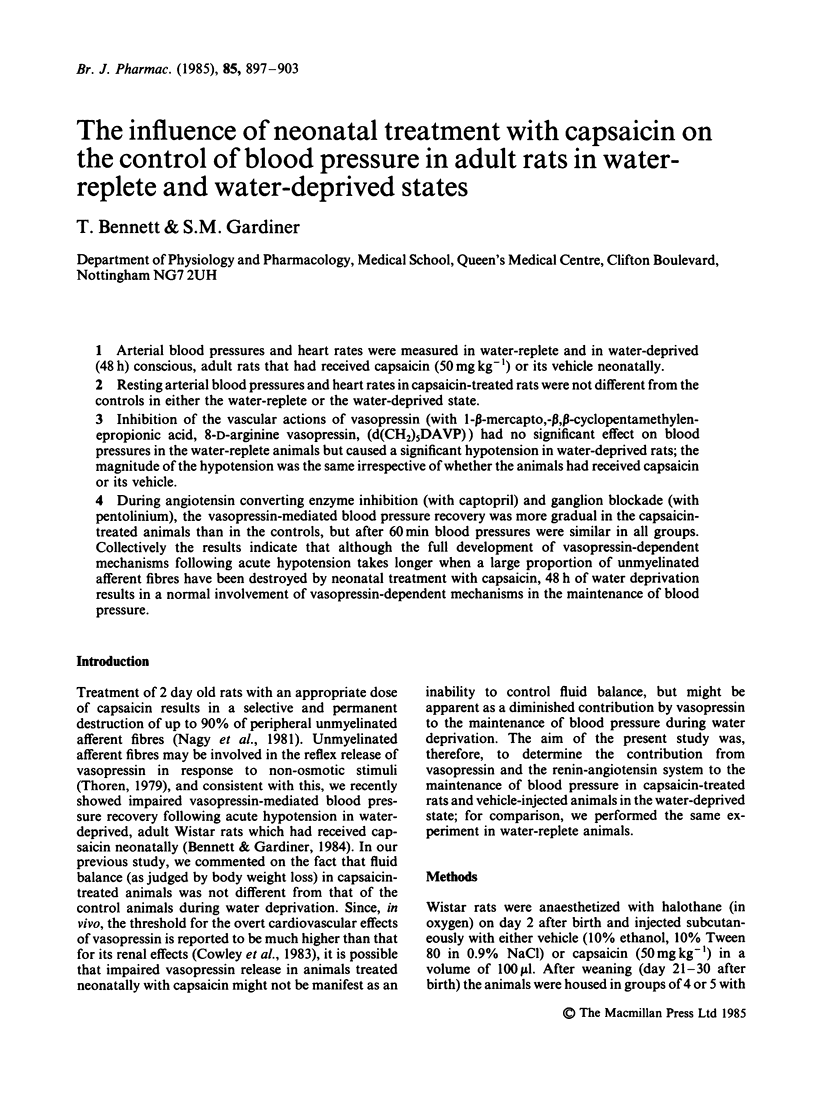
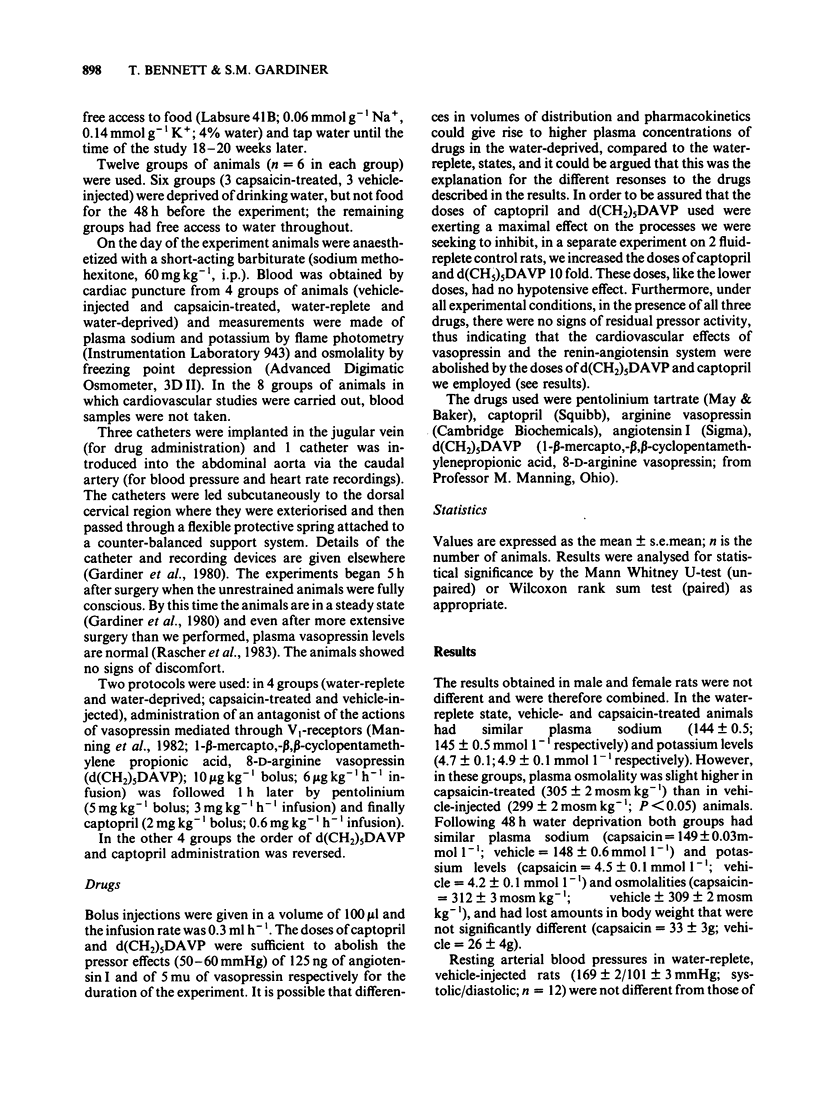
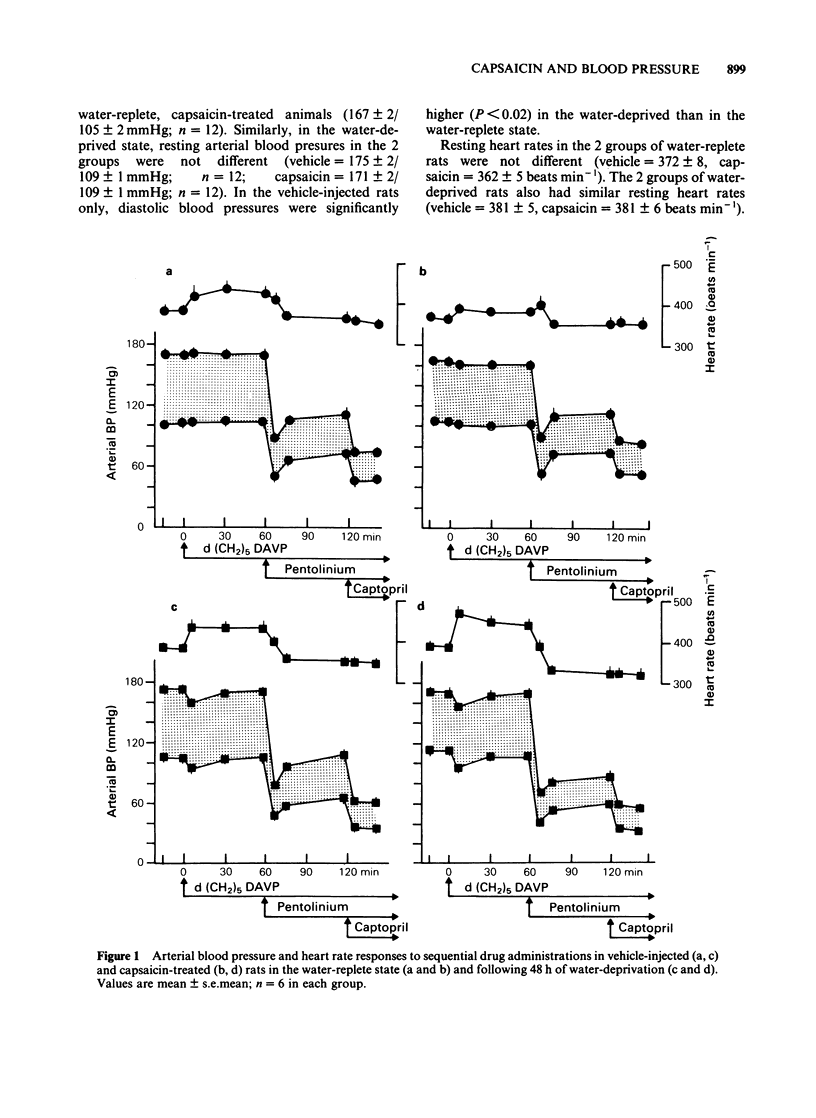
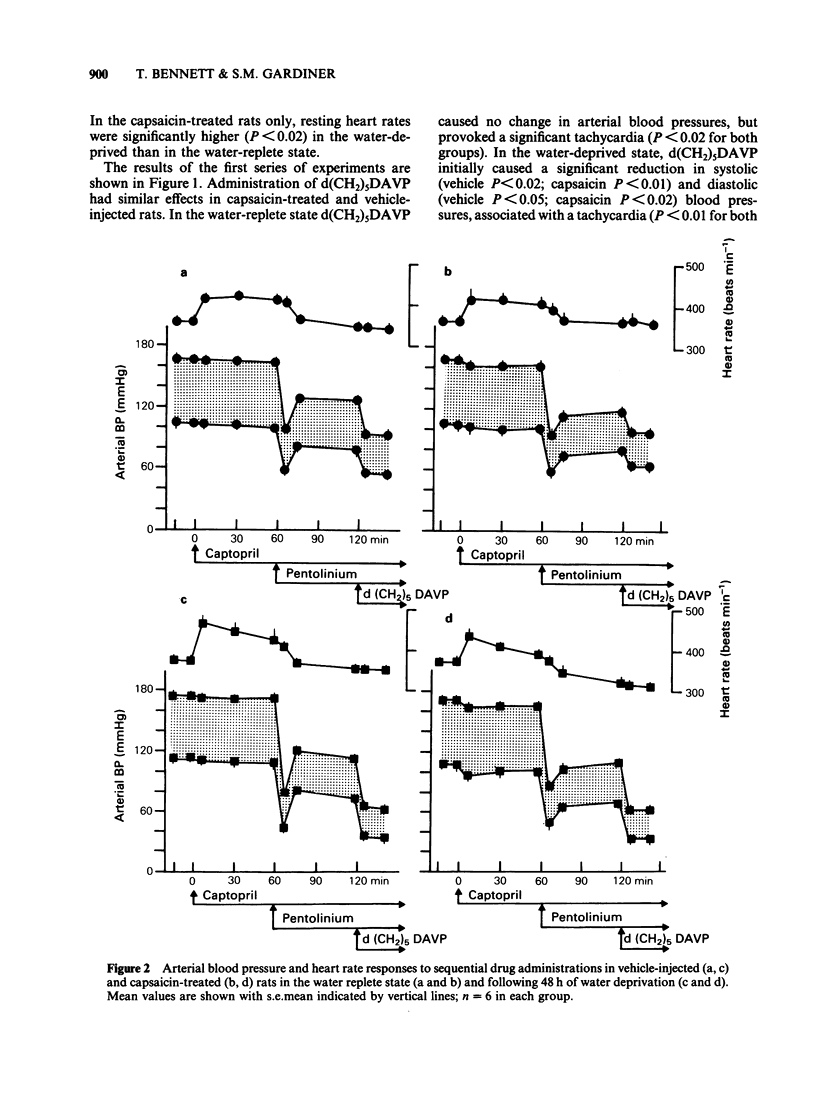
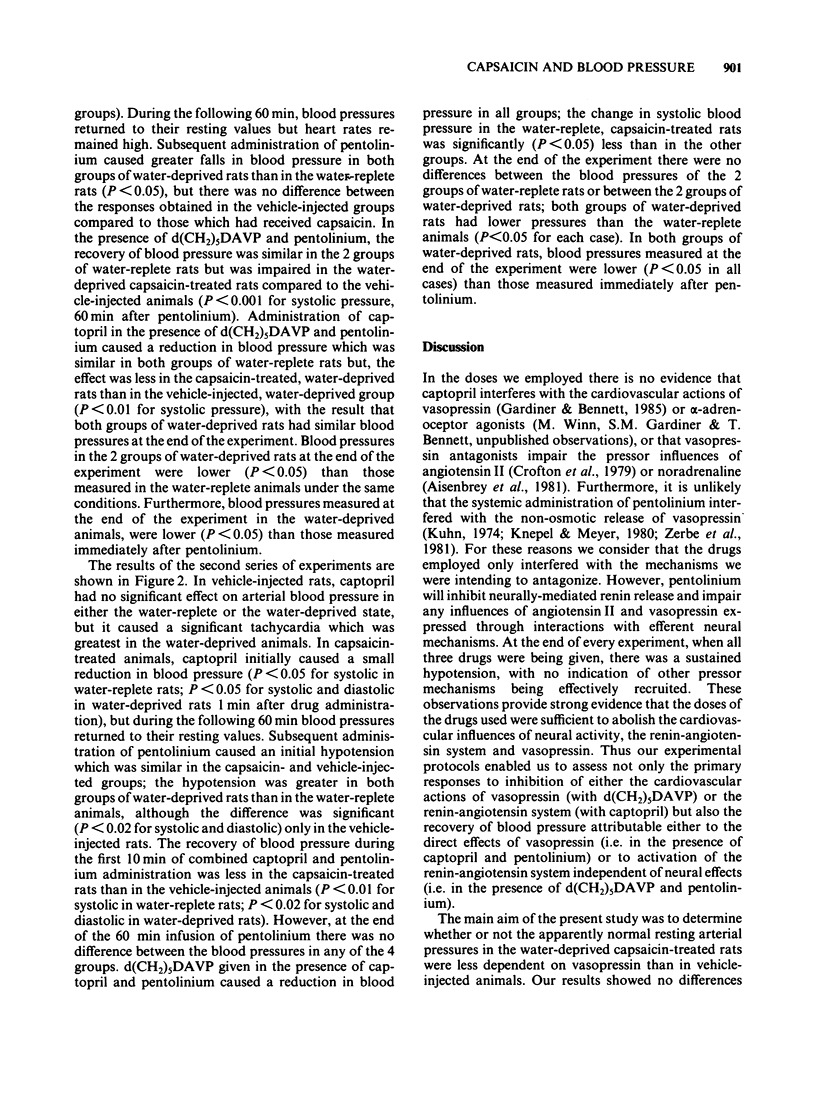
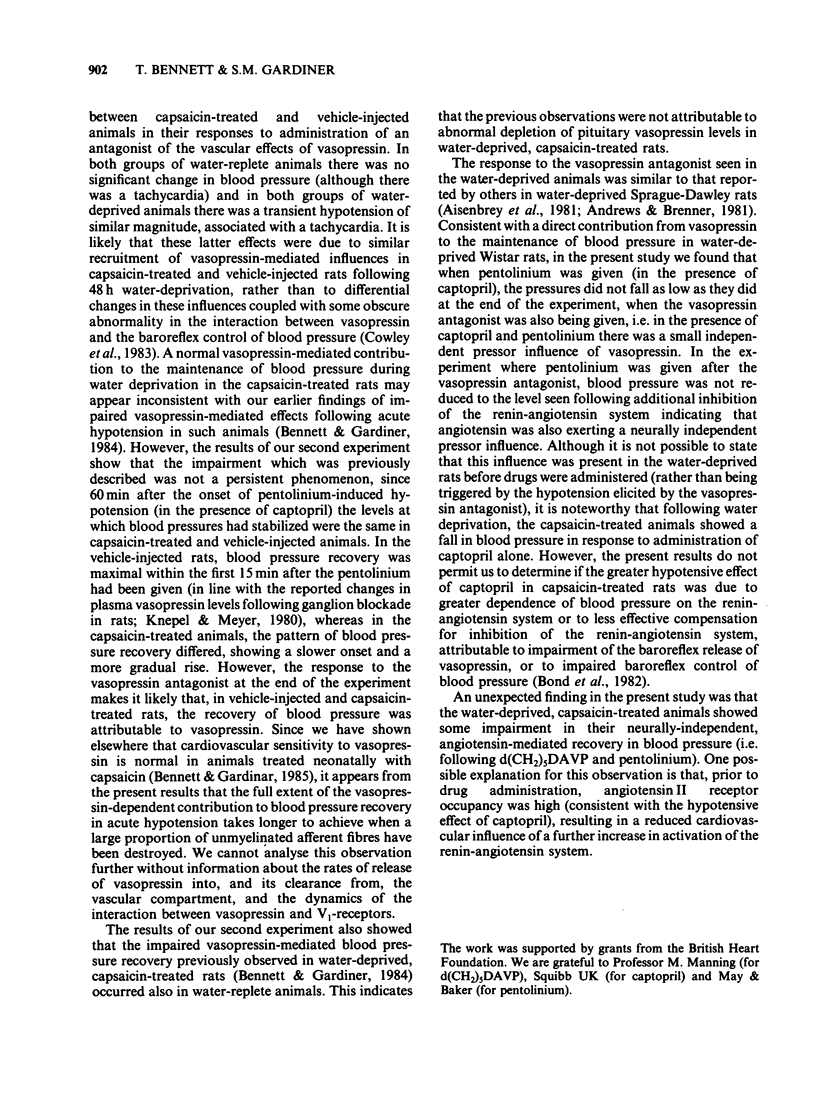
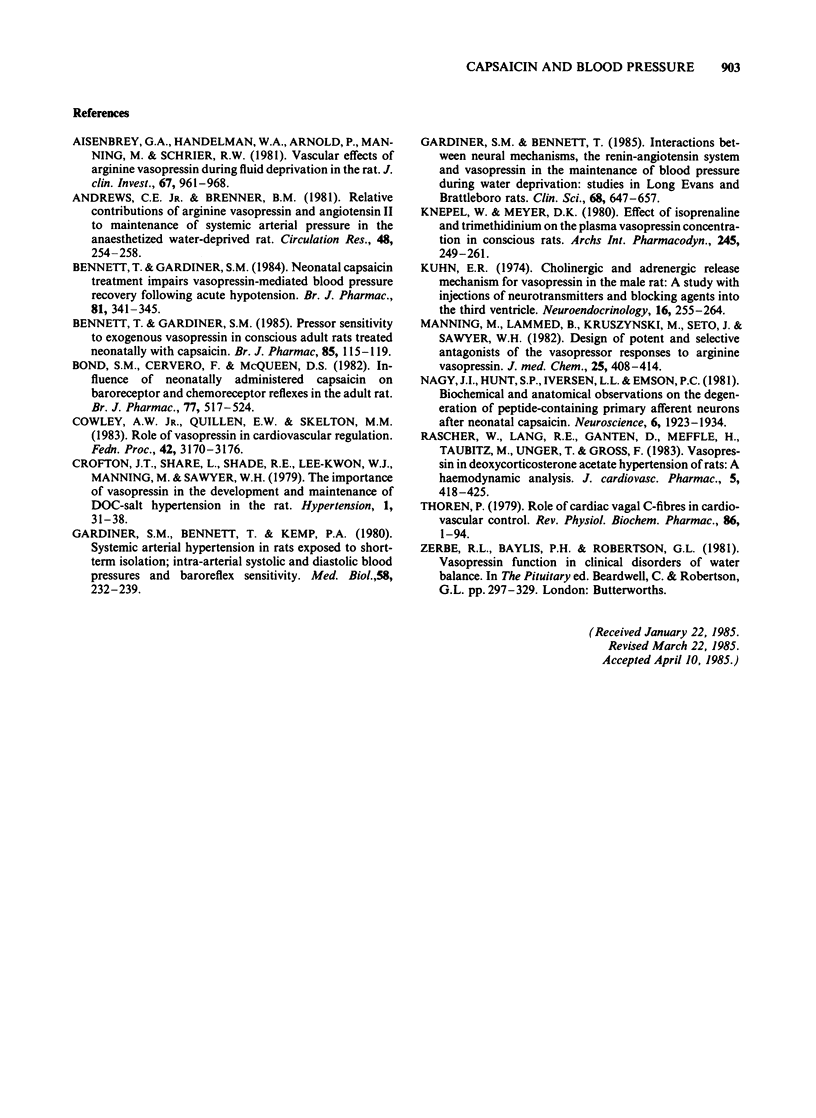
Selected References
These references are in PubMed. This may not be the complete list of references from this article.
- Aisenbrey G. A., Handelman W. A., Arnold P., Manning M., Schrier R. W. Vascular effects of arginine vasopressin during fluid deprivation in the rat. J Clin Invest. 1981 Apr;67(4):961–968. doi: 10.1172/JCI110146. [DOI] [PMC free article] [PubMed] [Google Scholar]
- Andrews C. E., Jr, Brenner B. M. Relative contributions of arginine vasopressin and angiotensin II to maintenance of systemic arterial pressure in the anesthetized water-deprived rat. Circ Res. 1981 Feb;48(2):254–258. doi: 10.1161/01.res.48.2.254. [DOI] [PubMed] [Google Scholar]
- Bennett T., Gardiner S. M. Neonatal capsaicin treatment impairs vasopressin-mediated blood pressure recovery following acute hypotension. Br J Pharmacol. 1984 Feb;81(2):341–345. doi: 10.1111/j.1476-5381.1984.tb10084.x. [DOI] [PMC free article] [PubMed] [Google Scholar]
- Bennett T., Gardiner S. M. Pressor sensitivity to exogenous vasopressin in conscious, adult rats treated neonatally with capsaicin. Br J Pharmacol. 1985 May;85(1):115–119. doi: 10.1111/j.1476-5381.1985.tb08837.x. [DOI] [PMC free article] [PubMed] [Google Scholar]
- Bond S. M., Cervero F., McQueen D. S. Influence of neonatally administered capsaicin on baroreceptor and chemoreceptor reflexes in the adult rat. Br J Pharmacol. 1982 Nov;77(3):517–524. doi: 10.1111/j.1476-5381.1982.tb09326.x. [DOI] [PMC free article] [PubMed] [Google Scholar]
- Cowley A. W., Jr, Quillen E. Q., Jr, Skelton M. M. Role of vasopressin in cardiovascular regulation. Fed Proc. 1983 Dec;42(15):3170–3176. [PubMed] [Google Scholar]
- Crofton J. T., Share L., Shade R. E., Lee-Kwon W. J., Manning M., Sawyer W. H. The importance of vasopressin in the development and maintenance of DOC-salt hypertension in the rat. Hypertension. 1979 Jan-Feb;1(1):31–38. doi: 10.1161/01.hyp.1.1.31. [DOI] [PubMed] [Google Scholar]
- Gardiner S. M., Bennett T. Interactions between neural mechanisms, the renin-angiotensin system and vasopressin in the maintenance of blood pressure during water deprivation: studies in Long Evans and Brattleboro rats. Clin Sci (Lond) 1985 Jun;68(6):647–657. doi: 10.1042/cs0680647. [DOI] [PubMed] [Google Scholar]
- Gardiner S. M., Bennett T., Kemp P. A. Systemic arterial hypertension in rats exposed to short-term isolation; intra-arterial systolic and diastolic blood pressure and baroreflex sensitivity. Med Biol. 1980 Aug;58(4):232–239. [PubMed] [Google Scholar]
- Knepel W., Meyer D. K. Effect of isoprenaline and trimethidinium on the plasma vasopressin concentration in conscious rats. Arch Int Pharmacodyn Ther. 1980 Jun;245(2):249–261. [PubMed] [Google Scholar]
- Kühn E. R. Cholinergic and adrenergic release mechanism for vasopressin in the male rat: a study with injections of neurotransmitters and blocking agents into the third ventricle. Neuroendocrinology. 1974;16(5-6):255–264. doi: 10.1159/000122572. [DOI] [PubMed] [Google Scholar]
- Manning M., Lammek B., Kruszynski M., Seto J., Sawyer W. H. Design of potent and selective antagonists of the vasopressor responses to arginine-vasopressin. J Med Chem. 1982 Apr;25(4):408–414. doi: 10.1021/jm00346a015. [DOI] [PubMed] [Google Scholar]
- Nagy J. I., Hunt S. P., Iversen L. L., Emson P. C. Biochemical and anatomical observations on the degeneration of peptide-containing primary afferent neurons after neonatal capsaicin. Neuroscience. 1981;6(10):1923–1934. doi: 10.1016/0306-4522(81)90032-4. [DOI] [PubMed] [Google Scholar]
- Rascher W., Lang R. E., Ganten D., Meffle H., Taubitz M., Unger T., Gross F. Vasopressin in deoxycorticosterone acetate hypertension of rats: a hemodynamic analysis. J Cardiovasc Pharmacol. 1983 May-Jun;5(3):418–425. doi: 10.1097/00005344-198305000-00011. [DOI] [PubMed] [Google Scholar]
- Thorén P. Role of cardiac vagal C-fibers in cardiovascular control. Rev Physiol Biochem Pharmacol. 1979;86:1–94. doi: 10.1007/BFb0031531. [DOI] [PubMed] [Google Scholar]


